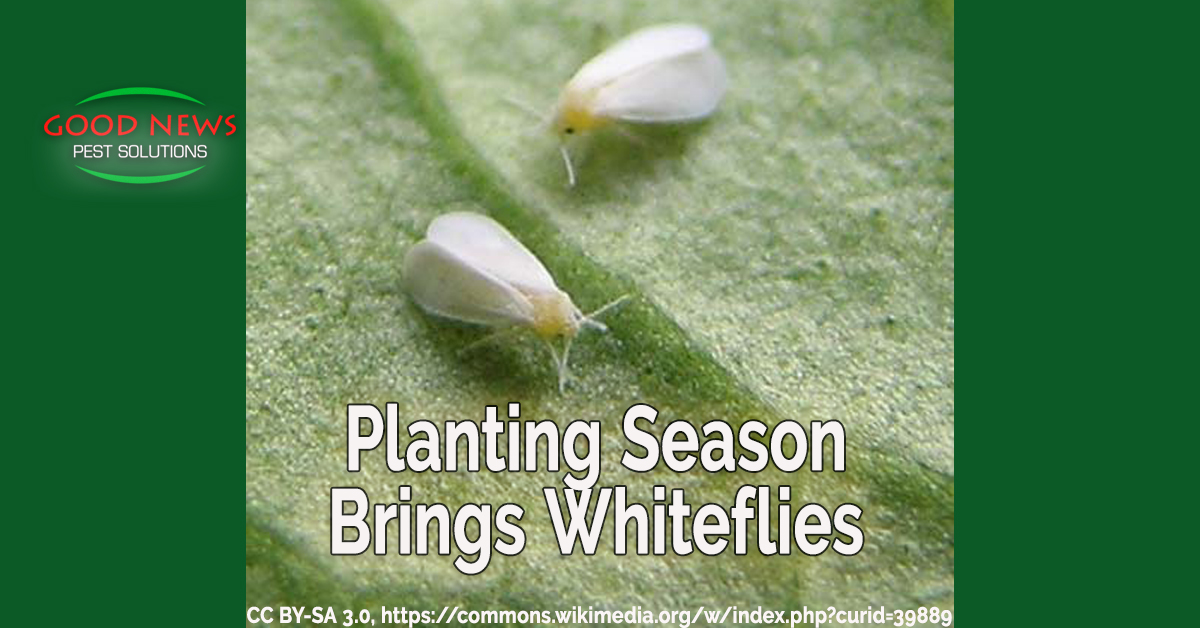
Planting Season brings Whiteflies
Here in the Sunshine State, our semi-tropical weather means we have a year-round growing season. Unfortunately, many garden plants will wilt in our warmer summers and direct sunlight.
But a few of the hardier vegetables – sweet potatoes, lima beans, okra, peppers, and watermelon do well in our Southwest Florida summers, only to face a smaller, deadlier threat – whiteflies.
These winged insects – which are not true flies at all – are closely related to aphids and mealybugs. They are triangular in shape and measure between a half and a full inch. They are usually found in clusters on the underside of leaves. Adult whiteflies are covered with a powdery white wax.
There are hundreds of species of whiteflies. In Florida, we primarily deal with the silverleaf (or sweet potato) whitefly, the citrus whitefly, and the ficus whitefly.
Care & Feeding
Whiteflies have mouthparts that both pierce and suck, similar in some small way to mosquitoes. They latch onto the bottom of leaves, sucking out the nectar and excreting a sugary substance known as honeydew.
The honeydew attracts other insects, like ants and wasps, that feed on it. It also contributes to the growth of a black fungus commonly called sooty mold. Because this all happens on the bottom side of the leaves, often the first sign of an infestation is the leaf turning yellow or wilting due to the lack of nutrients.
Whiteflies are also dangerous to many plants as a vector for diseases. Begomoviruses, criniviruses, torradoviruses, ipomoviruses and cowpea mild mottle viruses are all spread by whiteflies drawing the contaminant into their mouth parts and then depositing it on another plant when they relocate.
Adult female whiteflies can lay anywhere between 200 and 400 eggs in their lifetime. The eggs hatch within 4-12 days and the nymphs wriggle out and bite onto the underside of the leaf, where they molt and pupate into adult whiteflies. Depending on temperature and humidity, this process can take up to 6 months but is often shorter.
Dealing With Infestation
Because of their prolific reproduction cycle, the sooner you identify a whitefly infestation, the better chance you have of dealing with it. Management of heavy whitefly infestations is difficult at best.
It doesn’t help that the ants and wasps drawn to the whiteflies honeydew excretions also serve to ward off many of the whiteflies natural predators like lady bugs, lacewings, and predatory mites. Greenhouses and tropical weather are often an incubator for whitefly infestations. And whiteflies, by and large, have developed a resistance to most synthetic pesticides. Plus, once the insects come indoors, they are found feeding off some of your houseplants with smooth leaves.
The best way to control whiteflies on your own is to start with your garden hose. A hard spray of water to the affected areas knocks many of the whiteflies off. A more out of the box suggestion – applying aluminum reflective mulch - helps to confuse whiteflies searching for their preferred food source. It has also been found to be effective against other insect plant predators.
Doing what you can to attract some of the larger whitefly predators – hummingbirds and dragonflies - can be effective. If you have a significant infestation, a mild insecticidal soap or horticultural oil can be applied to the leaves.
While Good News Pest Solutions doesn’t deal directly with whiteflies, our Go Green Perimeter Plus solution can help and is effective against many of the more common insects that invade your home. For more information on all of our products and services, please give us a call!
« Back to Blog
Proudly Serving
Sun City Center, Ruskin, Palmetto, Parrish, Ellenton, Bradenton, Anna Maria, Holmes Beach, Bradenton Beach, Longboat Key, Lakewood Ranch, University Park, Myakka City, Sarasota, Siesta Key, Osprey, Nokomis, Casey Key, Venice, Englewood, North Port, Port Charlotte, Punta Gorda, Arcadia
Things You Can Do
Pay Your Bill Online
Leave Us a Review
Request a Free* Termite Inspection
Stop Mosquito Bites
Get Rid of Rodents
Get a Termite Damage Warranty
Get Pest Control for Your Attic
Get Pest Control for Your Business Request Prayer
Corporate Address
1080 Enterprise Court, Ste A
North Venice, FL 34275
Call Now: (941) 412-9610
Text: (941) 412-9610
Fax: (941) 412-0080
